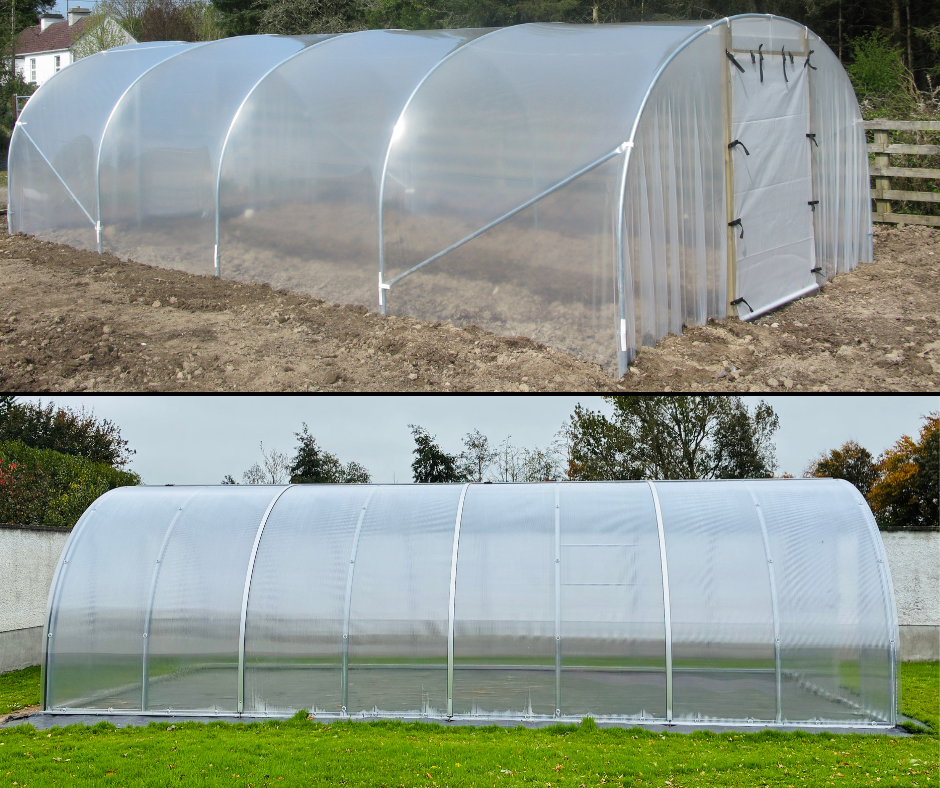Polycarbonate vs Polythene Polytunnels in Ireland
When choosing a new polytunnel, one of the first questions people ask is often: ‘Should I go with polycarbonate or polythene?’ At Polydome, we supply both options across Ireland, and each has its own strengths. This guide will help you decide which cover suits your garden, allotment, or farm best.
The first thing to say is not all Polytunnels are the same and not all Polycarbonate Tunnels are the same. As a rule of thumb things that are very cheap can be supplied that way because the materials are not as durable as more expensive options, as the saying goes ‘if you buy cheap you buy twice’. For example the cheapest Polycarbonate sheets will not be as long lasting or have good light transmission for as long as good quality sheets.
Durability and Quality
- Polythene: Flexible and cost-effective, our premium-grade 900 gauge polythene outperforms standard covers, providing excellent durability and extended usability compared with cheaper alternatives. It is manufactured with the highest amount of UV inhibitors that the manufacturer offers and consequently it is graded by them as extra long life polythene.
- Polycarbonate: Our polycarbonate panels are high-quality and come with UV protection on both sides of the sheet (most suppliers only have UV protection on one side), making them extremely resistant to damage, weathering, and fading.
Strength Against Irish Weather
- Polythene tunnels: Also manufactured with robust galvanised steel frames, they provide excellent shelter and reliability across Irish weather conditions. Our polythene being 900 gauge is more resistant to tears than lighter covers and if a tear comes (from something flying and hitting it in a storm) we have a super repair tape which has a very strong adhesive and the tape itself is strong, being nearly as thick as the polythene).
- Polycarbonate tunnels: The rigid panels and dual UV protection make them ideal for areas exposed to wind, rain, and harsh sun. The rigid nature of the panels adds structural strength to the building but on top of that our frames are made with 50mm box section galvanised steel tubes making them even more robust. Polycarbonate sheets can be cut with a stanley knife so could get damaged if something sharp hits them, but they are more resistant to impacts than polythene.
Light Transmission & Growing Conditions
-
Polythene: It will provide a higher light transmission than twin wall polycarbonate sheets, and has some diffusion of light (which is beneficial for plant growth), it is a good all year round cover for growing a variety of plants, particularly vegetables and flowers.
-
Polycarbonate: Provides excellent insulation as it is a twin wall material with an air gap between the walls, stable growing temperatures, and gives a lot of light diffusion – scattering the light so you don’t get sun scorch.
Functionality
-
Polythene tunnels: As we have a wide variety of polythene cover sizes available we can make a wider range of sizes more readily, and as we have been manufacturing Polytunnels for 40 years we have lots of options available such as crop support bars, roll up side vents which can be motorised, rainwater collection gutters and more. Our covers typically last 10 to 15 years before you need to recover, but sometimes they last longer.
-
Polycarbonate tunnels: Premium investment with long-lasting durability and protection for your plants. The insulated nature of the structure will benefit you if you wish to use a heater as the cost of running it will be a lot less than an uninsulated structure. Good quality polycarbonate sheeting should have a lifespan in excess of 20 years and it maintains higher light transmission than most other plastics. We would recommend Polycarbonate Tunnels particularly for situations where vandalism would be likely as it is less easy to damage compared to Polythene, or where you might want to use the building as a Workshop or Swimming Pool Dome.
Practical considerations
- Polythene Tunnels: If you have a site of easily diggable soil and it has a slight slope along the length you can erect the Polytunnel without doing any levelling and construction for smaller sizes can be done cost effectively.
- Polycarbonate Tunnels: The steel base of the Polycarbonate Tunnel must be put down exactly flat and level and ‘square’. It is preferable to put down a concrete strip foundation that is slightly proud of the surrounding ground (to stop surface water outside coming in), or erect it on a concrete slab.
Cost Considerations
-
The price for either a Polycarbonate Tunnel or a Polythene Tunnel depends on the specification that you choose (i.e. what optional extras you choose) and that will depend on how you want to use it and what the site is like where it is being constructed. Please consult with us on your requirements and we can price it for you.
Which Tunnel Should You Choose?
- 👉 At Polydome, we only use the best materials, ensuring whichever option you choose will stand the test of time and Irish weather. The first step in figuring out which one will suit you is to consider how you want to use it and also knowing where you wish to site it (what sort of ground conditions and whether it is level or not). We will be pleased to discuss all of this with you and advise.





